Na-Benzoyl-DL-arginine-4-nitroanilide hydrochloride is widely utilized in research focused on:
- Biochemical Assays: This compound serves as a substrate in enzyme assays, particularly for studying proteolytic enzymes. Its specificity allows researchers to measure enzyme activity accurately, aiding in drug development and biochemical research.
- Pharmaceutical Development: In the pharmaceutical industry, it is used to synthesize various drug candidates. Its unique structure can enhance the efficacy of certain compounds, making it valuable in the formulation of new medications.
- Diagnostics: The compound is applied in diagnostic tests, particularly in the detection of specific enzymes in clinical samples. This application is crucial for early disease detection and monitoring therapeutic responses.
- Research on Protein Interactions: It is used in studies examining protein-protein interactions, which are vital for understanding cellular processes and developing targeted therapies for diseases.
- Educational Purposes: This chemical is often included in university laboratories for teaching purposes, helping students understand enzyme kinetics and molecular interactions in a practical setting.
General Information
Properties
Safety and Regulations
Applications
Na-Benzoyl-DL-arginine-4-nitroanilide hydrochloride is widely utilized in research focused on:
- Biochemical Assays: This compound serves as a substrate in enzyme assays, particularly for studying proteolytic enzymes. Its specificity allows researchers to measure enzyme activity accurately, aiding in drug development and biochemical research.
- Pharmaceutical Development: In the pharmaceutical industry, it is used to synthesize various drug candidates. Its unique structure can enhance the efficacy of certain compounds, making it valuable in the formulation of new medications.
- Diagnostics: The compound is applied in diagnostic tests, particularly in the detection of specific enzymes in clinical samples. This application is crucial for early disease detection and monitoring therapeutic responses.
- Research on Protein Interactions: It is used in studies examining protein-protein interactions, which are vital for understanding cellular processes and developing targeted therapies for diseases.
- Educational Purposes: This chemical is often included in university laboratories for teaching purposes, helping students understand enzyme kinetics and molecular interactions in a practical setting.
Documents
Safety Data Sheets (SDS)
The SDS provides comprehensive safety information on handling, storage, and disposal of the product.
Product Specification (PS)
The PS provides a comprehensive breakdown of the product’s properties, including chemical composition, physical state, purity, and storage requirements. It also details acceptable quality ranges and the product's intended applications.
Certificates of Analysis (COA)
Search for Certificates of Analysis (COA) by entering the products Lot Number. Lot and Batch Numbers can be found on a product’s label following the words ‘Lot’ or ‘Batch’.
*Catalog Number
*Lot Number
Certificates Of Origin (COO)
This COO confirms the country where the product was manufactured, and also details the materials and components used in it and whether it is derived from natural, synthetic, or other specific sources. This certificate may be required for customs, trade, and regulatory compliance.
*Catalog Number
*Lot Number
Safety Data Sheets (SDS)
The SDS provides comprehensive safety information on handling, storage, and disposal of the product.
DownloadProduct Specification (PS)
The PS provides a comprehensive breakdown of the product’s properties, including chemical composition, physical state, purity, and storage requirements. It also details acceptable quality ranges and the product's intended applications.
DownloadCertificates of Analysis (COA)
Search for Certificates of Analysis (COA) by entering the products Lot Number. Lot and Batch Numbers can be found on a product’s label following the words ‘Lot’ or ‘Batch’.
*Catalog Number
*Lot Number
Certificates Of Origin (COO)
This COO confirms the country where the product was manufactured, and also details the materials and components used in it and whether it is derived from natural, synthetic, or other specific sources. This certificate may be required for customs, trade, and regulatory compliance.


